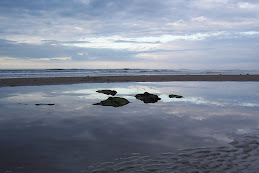ContainedI was once sand.
Then I was mixed with soda ash and lime
and roasted.
My colour came from cobalt
which did for my first master's lungs.
So he swapped me to pay for the brew,
he called medicine,
my new mistress stewed in her cauldron.
She filled me with the juice from a rat's spleen.
It stank and stained my sides.
I wasn't happy.
But hey, what did I have to say about it,
I was but a vessel.
They came one night,
crying, "murderer," "whore,"
dragged her out by the hair,
smashing their fists and clubs
into her wormy bedstead and flawed jars.
I was saved.
It was the way the candle light
was caught and reflected back,
gold and green,
which attracted him.
He seized me by the neck,
I thought he would snap it,
but then he hid me away in the harsh folds of his woollen cloak.
For years, I held vinegary wine,
until my master's wife became a widow.
She outlawed the stuff,
replacing it with figs and syrup.
I was passed on to her daughter
and then to her daughter
and to hers.
I held lemonade in the Summers,
barley milk in the Winters,
once a bunch of flowers for a wedding,
some sparkling elderflower for a christening,
a quantity of blood red port for a funeral.
Life was short,
meted out in a miserly fashion,
sunrise to sunset
was a span long enough.
I did not lose my colour nor my shape
as those around me did.
It was two meagre harvests
and a hacking cough, pitiful to hear,
that finally saw off the family.
Those that did not succumb, left.
The house, already slouched,
fell to ruin.
I was looted along with a feather filled quilt
and oak beams.
Chimneys replaced the trees where I came to live.
I was not much admired then.
Smoke clogged the air
and grimed my sides and anyway
I was up against the new, the modern,
the mass produced.
I was shoved to the back,
a receptacle for nails and screws.
Then the shuddering,
the noise, the splintered wood,
the smashed plaster, the crushed brick.
All around me fractured.
I toppled
but I did not break,
the debris held me in an airless tomb.
Rubble, earth, bone,
a skinless foot taps against my body
as the world is turned upside down
once more and once more.
Finally there came a time when you wondered
more about the past than the future,
and you dug and scraped and lifted,
until I was taken up in a human hand once more.
I was cleaned and turned and passed around.
And now I stand
in this glass box,
still blue, still rotund and graceful.
Still
and empty.
Kate Evans, 2007


